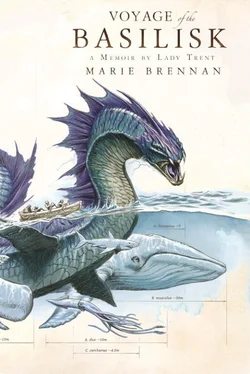I will not pretend I founded the Flying University in order to educate unsatisfactory governess candidates. Indeed, most of those young ladies I never saw again, as they moved on in search of less stringent employers. But the experience heightened my awareness of that lack in our society, and so once I had my subscription to the Alcroft, I made the contents of my library (both owned and borrowed) available to anyone who wished to make use of it.
The result was that, by the time my sea expedition began, on any given Athemer evening you might find anywhere from two to twenty people occupying my sitting room and study. The former room was a place of quiet reading, where friends might educate themselves on any subject my library could supply. Indeed, by then its reach extended far beyond my own shelves and items borrowed from the Alcroft, as it became a trading center for those who wished to avail themselves of others’ resources. Candles and lamps were one point upon which I did not scrimp, and so they could read in perfect comfort.
The study, by contrast, was a place of conversation. Here we might ask questions of one another, or debate issues on which we held differing views. Often these discussions became quite convivial, the lot of us raising one another up from the darkness of ignorance and into the light of, if not wisdom, then at least well-informed curiosity.
On other occasions, the discussions might better be termed “arguments.”
“You know I love wings as much as the next woman,” I said to Miriam Farnswood—who, as a lady ornithologist, was the next woman, and very fond of wings. “But you are overstating their significance in this instance. Bats fly, and so do insects, and yet no one is suggesting that they are close relatives of birds.”
“No one yet has found evidence of bats laying eggs,” she said dryly. Miriam was nearly twenty years my senior, and it was only in the last six months that I had ventured to address her by her given name. Not coincidentally, the last six months had also seen the commencement of this particular debate, in which we were very much at odds. “It’s your own work that persuades me, Isabella; I don’t know why you resist so strenuously. The skeletal structure of dragons shows many resemblances to that of birds.”
She was referring, of course, to the hollow structure of the bones. This was not often to be found in reptiles, which I championed as the nearest relation to dragons. I said impatiently, “Hollow bones may easily be evolved on separate occasions. After all, that is what seems to have happened with wings, is it not? Much less common to evolve a new set of forelegs, where none were before.”
“You think it more plausible that reptiles suddenly evolved wings, where none had previously been?” Miriam snorted. It was not a very ladylike snort. She was the sort of woman one expected to find tramping the countryside in tweeds with a gun under her arm and a bulldog at her side, probably one of her own breeding. The delicacy with which she moved when out birding was nothing short of startling. “Please, Isabella. By that reasoning, you should be arguing for their relation to insects. At least those have more than four limbs.”
The reference to insects diverted me from what I had been about to say. “Sparklings do complicate the picture,” I admitted. “I really am persuaded that they are an extremely dwarfish breed of dragon—though I am at a loss to explain how such a reduction in size might come about. Even those tiny dogs they have in Coyahuac are not so much smaller than the largest breed of hound.”
My comment brought a quiet chuckle from a few feet away. Tom Wilker had been in conversation with the suffragette Lucy Devere, discussing the politics of the Synedrion, but their talk had momentarily flagged, and he had overheard me. It was not the first time he had been subjected to my thoughts on sparklings, which were an endless conundrum to me in matters of taxonomy.
We could hardly avoid eavesdropping on one another’s words. My Hart Square townhouse was not so large as to give us much in the way of elbow room. And indeed, I often preferred it that way, for it encouraged us to wander from topic to topic and group to group, rather than separating off into little clusters for the duration of the evening. Tabitha Small and Peter Landenbury had been sharing their thoughts on a recent work of history, but as usual, Lucy had drawn them into her orbit. With Elizabeth Hardy rounding out their set, there were seven of us in my study, which more or less filled it to capacity.
Miriam’s eyebrows had gone up at my digression from the point. I shook my head to clear it and said, “Be that as it may. I think you are reading too much into the fact that the quetzalcoatls of Coyahuac have feathers. They are not true dragons, by Edgeworth’s definition—”
“Oh, come now, Isabella,” she said. “You can hardly use Edgeworth as your defense, when you yourself have led the charge in questioning his entire theory.”
“I have not yet reached any conclusions,” I said firmly. “Ask me again when this expedition is done. With any luck, I will observe a feathered serpent with my own eyes, and then I will be able to say with more certainty where they fit in the draconic family.”
The door opened quietly, and Abby Carew slipped through. She looked tired, even in the forgiving candlelight. Jake had been running her ragged lately. The prospect of going on a sea voyage had so fired his imagination that he could hardly be made to sit at his lessons.
The notion of bringing my son along had come to me about two years previously. When I first conceived the notion of a trip around the world, to study dragons in all the places they might be found, Jake had been a mere toddler—far too young to accompany me. But such a expedition is not organized overnight, nor even in a single year. By the time I was certain the expedition would happen, let alone had prepared myself for it, Jake was already seven. Boys have gone to war at sea that young. Why should one not go in the name of science?
I had not forgotten the opprobrium I faced when I went to Eriga, leaving my son behind. It seemed to me that the clear solution to this problem was not to stay forever at home, but rather to bring him with me the next time. I saw it as a splendid educational opportunity for a boy of nine. Others, of course, saw it as more of my characteristic madness.
I excused myself to Miriam Farnswood and crossed the room to meet Abby. She said, “Natalie sent me to tell you—”
“Oh dear,” I sighed, before she could finish. A guilty look at the clock confirmed my suspicion. “It has gotten late, hasn’t it?”
Abby was kind enough not to belabor the point. The truth was, I did not want to show my guests to the door. This was to be our last gathering before I left—or rather I should say my last gathering, since Natalie would continue to host them in my absence. As much as the upcoming voyage excited me, I would miss these evenings, where I could expand my mind and test its strengths against people whose intelligence dwarfed mine. Thanks to them, my understanding of the world had grown far beyond its early, naive beginnings. And I, for my part, had done what I could to share my knowledge in return, especially with those individuals, male or female, whose opportunities had not been as great as mine.
I write in the past tense now; I caught myself thinking in the past tense then, and shook myself. I was going on a voyage, not relocating to the other side of the world forever. What had started in my sitting room was not ending tonight. My part in it was merely pausing.
They went without a fuss, though with a great many good wishes for safe travels and great discoveries. The farewells took more than a half hour in all. The last to depart was Tom Wilker, who had no need to say farewell; we would be going on the voyage together, for I could not imagine trying to conduct research without his assistance.
Читать дальше












